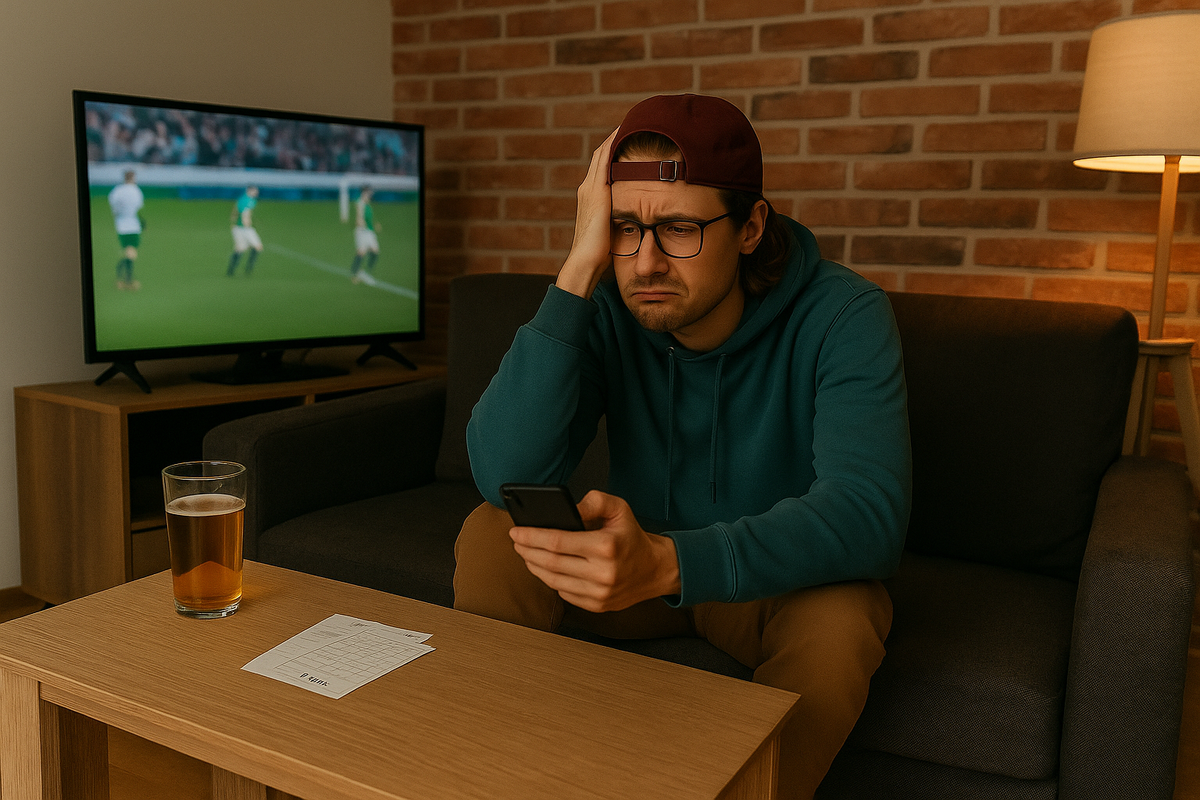When Betting Stops Being Fun: 5 Questions to Ask Yourself


HotTakes
Real talk: if you're reading this, you're already ahead of most bettors. Self-awareness is the ultimate edge. The sharpest players in the game don't just track their bets—they track their relationship with betting itself.
Here's the thing about sports betting: it's designed to be exciting. That rush when your pick hits, the anticipation watching a game with action on it, the satisfaction of outsmarting the market—that's all part of what makes it engaging. But somewhere between "fun hobby" and "serious problem," there's a line that's easier to cross than most people think.
We talk a lot about cognitive biases, emotional discipline, and systematic thinking on HotTakes. Well, those same analytical skills you use to evaluate lines? They apply to evaluating your own behavior too. Think of this as a mental edge check-in, but instead of examining the market, we're examining ourselves.
The Sharp Bettor's Self-Assessment
Let's run through five questions. Answer honestly—nobody's watching, and there's no judgment here. If you find yourself saying "yes" to two or more of these, keep reading. This might be the most important piece of content you see all week.
1. Are you chasing losses more than you're making calculated plays?
You know the feeling. Bad beat on Sunday night, and suddenly Monday afternoon you're scanning for any halfway-decent line to "get it back." The original bankroll management system you built? Out the window. You're not betting on value anymore—you're betting on urgency.
Sharp bettors have losing days, losing weeks, even losing months. That's variance. But when your betting decisions are driven by recovering what you've lost instead of identifying genuine edges, that's not strategy anymore. That's emotional gambling.
The honest question: In your last 10 bets, how many were about finding value versus trying to recover from previous losses?
2. Are you betting money you can't actually afford to lose?
We've all heard the advice: "only bet what you can afford to lose." But let's get specific, because that phrase doesn't hit the same when you're in the moment.
Are you betting money that was supposed to cover bills? Money you'd normally put toward rent, groceries, or other non-negotiable expenses? Have you borrowed money from friends, family, or credit cards to fund your betting? Are you skipping payments on other things to maintain your bankroll?
If your betting budget is coming from anywhere other than truly discretionary income—money that could disappear tomorrow without affecting your actual life—then you've crossed a critical line.
The honest question: If you lost your entire current bankroll today, would it affect your ability to pay for essentials this month?
3. Are you hiding your betting activity from people close to you?
This one's subtle but significant. When betting is entertainment, you talk about it casually. You might text your buddy about a close game or joke about a bad beat. But when you start actively concealing how much you're betting, how often you're betting, or how much you've lost—that's a psychological red flag.
Lying about losses to your partner. Deleting betting apps before someone might see your screen. Creating separate accounts your family doesn't know about. Downplaying how much you're actually betting when someone asks. These aren't just privacy preferences—they're warning signs that you know something's off.
The honest question: Would you be comfortable showing someone you trust your complete betting history from the last month?
4. Is betting consuming time that used to go to other things you valued?
Think about your life three months ago versus now. Have you skipped social plans to watch games you have action on? Bailed on hobbies or activities you used to enjoy? Found yourself constantly checking lines, reading injury reports, or consuming betting content when you're supposed to be doing other things?
The sharp bettor's routine includes research and analysis—that's part of the process. But when betting content and betting activity starts taking over time you used to spend on work, relationships, exercise, or other interests, that's not dedication to your craft. That's compulsion.
The honest question: How many hours per day are you spending on betting-related activities, and what are you not doing anymore as a result?
5. Do you feel restless, anxious, or irritable when you're not betting?
This is the psychological dependence indicator. When betting shifts from something you do for entertainment to something you
need
to do to feel normal, you've entered different territory.
Do you feel anxious on days when there aren't games you want to bet? Do you find yourself searching for action just to have something going, even when there's no real value? Has betting become your go-to solution for boredom, stress, loneliness, or other uncomfortable emotions?
Entertainment adds to your life. Dependence replaces parts of it.
The honest question: When you imagine going a full week without placing a single bet, what emotions come up?
Understanding What's Actually Happening
If you answered "yes" to multiple questions, here's what you need to understand: this isn't about being "weak" or lacking discipline. Problem gambling is a psychological pattern that's reinforced by the same neurochemical reward systems that make the activity enjoyable in the first place.
Remember how we talk about cognitive biases in betting? The recency bias that makes you overvalue yesterday's results? The confirmation bias that makes you see patterns that aren't there? Those same psychological vulnerabilities that affect betting decisions also make problem gambling patterns hard to recognize in yourself.
The gambling industry—from Vegas to apps—has spent billions of dollars optimizing for engagement. Variable reward schedules (you never know when you'll win) are literally the most psychologically addictive design pattern humans have discovered. When you combine that with the illusion of skill in sports betting, you get a perfect storm for problematic behavior.
This isn't a moral failing. It's a predictable psychological outcome when entertainment crosses into compulsion.
What to Do Right Now
If you're recognizing yourself in these questions, here are immediate steps you can take. Choose the level of intervention that matches where you are:
Level 1: Soft Boundaries (Concerns, but not crisis)
Set strict app limits: iOS and Android both have screentime controls. Lock your betting apps after a set amount of daily use.
Tell one trusted person: Share your concerns with someone close to you. Just saying it out loud to another human changes the dynamic.
Implement a 24-hour rule: No bets placed within 24 hours of thinking about them. Eliminates impulse action.
Schedule betting-free days: Pick two days per week with zero betting activity. Prove to yourself you can.
Level 2: Active Intervention (Recognizing a real problem)
Use deposit limits: Most betting apps allow you to set daily, weekly, or monthly deposit limits. Set them lower than you think you need.
Self-exclude from some platforms: You don't have to quit everything immediately, but removing access to some betting options creates friction that helps.
Find an accountability partner: Give someone you trust access to check your betting activity. Regular check-ins create external structure.
Start tracking emotional states: Before each bet, write down how you're feeling. Pattern recognition will show you triggers.
Level 3: Professional Help (This is beyond self-management)
Contact the National Council on Problem Gambling: 1-800-522-4700 (call or text). Free, confidential help 24/7.
Try the Crisis Text Line: Text "SUPPORT" to 741741. Trained crisis counselors available immediately.
Find a Gamblers Anonymous meeting: ga.org has a meeting finder. Both in-person and online options available.
Look into therapy: Many therapists specialize in gambling addiction. Your insurance may cover it.
Consider comprehensive self-exclusion: Most states have programs that ban you from all gambling establishments and apps.
The level you need isn't about how "bad" things are—it's about what will actually work for where you are right now. And here's something important: you can always increase the level of support. Starting with Level 1 and realizing you need Level 3 isn't failure. It's progression.
Additional Resources
These organizations exist specifically to help, and everything is confidential:
National Council on Problem Gambling
Phone/Text: 1-800-522-4700
Website: ncpgambling.org
Live chat available
Gamblers Anonymous
Website: ga.org
Find local and online meetings
Peer support from people who've been there
Gambling Therapy
Website: gamblingtherapy.org
Free online support and counseling
Global community
SAMHSA National Helpline
Phone: 1-800-662-4357
Mental health and substance abuse services (gambling falls under this)
Available 24/7
Your State's Gambling Help Resources
Most states have dedicated programs. Search "[Your State] gambling help" for local resources, including self-exclusion programs.
The Bottom Line
We built HotTakes to celebrate sports knowledge, create community, and help people get better at prediction and analysis. But none of that matters if the activity itself becomes harmful.
The smartest play you can make is recognizing when betting has stopped being entertainment and started being something else. Seeking help isn't giving up on sports or betting—it's taking care of yourself so you can have a healthy relationship with both.
Your move is your move. But if you're reading this and feeling that uncomfortable recognition of patterns you've been ignoring, do something about it today. Not tomorrow. Today.
The HotTakes community is here for you, whether you're betting or taking a break or figuring out what healthy looks like for you. What matters is that you're here, you're aware, and you're willing to be honest with yourself.
That self-awareness you brought to this article? That's the edge that matters most.
If you or someone you know needs immediate help with problem gambling, call the National Council on Problem Gambling at 1-800-522-4700 or visit ncpgambling.org.
This content is part of our commitment to responsible gaming education. For more resources on building healthy betting habits, check out our blog articles.

